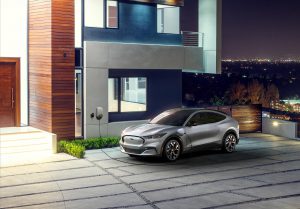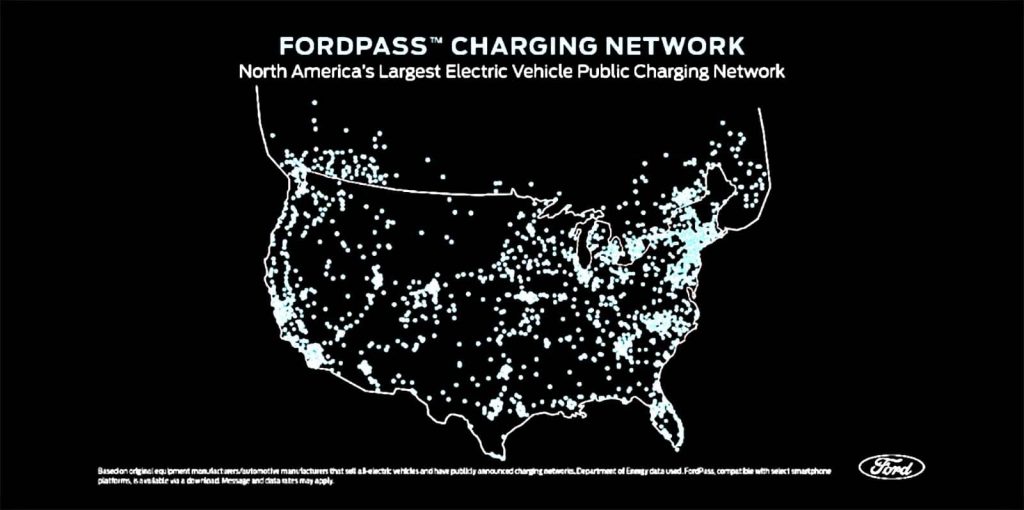Range and price are often cited as the two big obstacles to EV adoption. But there’s a third key challenge: charging times. The good news is that automakers are finding ways to help motorists “pump” more energy into their batteries faster than ever.
Ford, for one, has revised the numbers for its first long-range battery-electric vehicle, the Mustang Mach-E which, it revealed, will be able to boost its charging capabilities by as much as 30%, getting an additional 61 miles of range in just 10 minutes using a 150 kilowatt-hour fast charger.
“Mustang customers love the open road and less time recharging means more time enjoying the drive,” Mark Kaufman, Ford’s global director of electrification, said in a Friday announcement. “We’ve made it a priority to make it faster to recharge their Mustang Mach-E, and we’re continuing to work with providers to ensure even more charge points are available through FordPass to make it easier to recharge.”
(Reservations for Mach-E reach into every state.)
Early EVs often required a full night’s charge, even using a 240-volt Level 2 charger, just to get 100 miles of range. That sort of snail’s pace would be unacceptable as more and more manufacturers go with long-range batteries that can deliver 200, 300 and even 400 miles of range.
It helps that there are more and more Level 3 fast chargers popping up around the country, especially along the coasts. And those literally are being amped up, going from early 50 kilowatt systems to the now common 150 kW – with many new energy stations offering as much as 350 kW capabilities. Right now, only a few vehicles can handle those higher loads but it is expected to become the norm as more new models come to market.
Ford’s Mustang Mach-E, which is set to start rolling into showrooms throughout the summer, can handle up to a 150 kW charger and the automaker says that as it works on final development it has found the battery pack able to suck down power faster than expected – getting as much as 61 miles of added range in just 10 minutes – or 30% faster than what it expected when the Mach-E was unveiled last November.
There’s a caveat, however, the numbers specifically applying to a Mach-E equipped with an extended-range 98.8 kilowatt-hour battery and rear-wheel-drive. All-wheel-drive versions will get an added 52 miles in 10 minutes, still faster than what was first announced.
(Ford Mustang Mach-E first edition sold out.)
Why 10 minutes? The automaker suggests this is the sort of time you’d expect to spend if you ran out to pick up a fast food order. It also notes that both the RWD and AWD drive versions of the Mach-E can go from a near-empty 10% “state-of-charge” to 80% of full capacity in 45 minutes on that 150 kW quick charger.
So, how does this compare to other long-range EVs? The Audi e-tron claims it can go from 10 to 80% in 30 minutes on that 150 kW charger – though TheDetroitBureau.com found that it took longer in real-world conditions. Tesla claims that its updated, 250 kW V3 Supercharger will deliver 75 miles in just five minutes for a Model 3 Long Range, though it takes significantly longer on most of its current chargers.
The near-term speed king is the Porsche Taycan Turbo S. The all-electric sports car will be the first to use a 350 kW system – with the upcoming Audi e-tron GT to follow – and it’s expected to get its 93 kWh pack from 8% to 80% in a mere 20 minutes.
Porsche may not hold the record for long. General Motors President Mark Reuss recently told TheDetroitBureau.com that the automaker is working on ways to charge up the new Ultium batteries that will be used in products like the Cadillac Lyriq and GMC Hummer to a nearly full 90% in as little as 10 minutes, or about the time it takes to fill up a near-empty gas tank. Reuss cautioned that GM will start out more cautiously and track the performance of its third-generation EV technology then use over-the-air updates, much like Tesla, to enhance charging times, and other capabilities.
As for the other versions of the Ford Mustang Mach-E, the automaker now says various versions of the EV SUV with a 75.7 kWh battery will get anywhere from 42 to 46 miles more range in 10 minutes and hit 80% in 38 minutes.
(New Mustang Mach-E is just the first step in “electrification” for Ford.)
Separately, Ford announced on Friday that its expanding FordPass Charging Network will give its EV customers access to 13,500 stations and almost 40,000 chargers, an increase of 1,000 and 5,000, respectively, from what it announced last autumn.




The name still chides the hide. It would be just that much more…to actually have a Mustang Mach-E, not a full-electric CUV named mustang mach-e, to get people to buy it. I mean, since Mustang is really FOMOCO’s only “car” and this is clearly an “UV”, why not just call it something else. This just reminds me of the Lincoln debacle with calling everything Mark XYZ…
My opinion of course.
I was skeptical at first but having ridden in one and spent time with it, this is growing on me. Paul E.